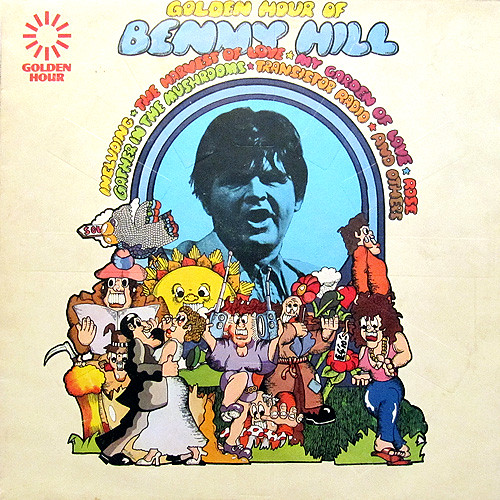
It was a few days ago that I had an internet station called Nashville Classics on all day at work. That’s country, and it covers a lot of territory. They play a lot of Hank Williams, Faron Young, Kitty Wells, Merle Haggard, Johnny Cash – stuff that you’d expect on a station called “Nashville Classics.” (And yes they play Buck Owens and Waylon Jennings, notwithstanding their non-Nashville credentials). But then they get into crap like The Gambler by Kenny Rogers, or stuff by Keith Whitley. You gotta take the good with the bad. (Not all the “new” stuff is bad; I heard Tennessee Flat-top Box by Rosanne Cash).
Hank Snow was definitely classic Nashville, notwithstanding his Canadian origins. What I have is
The Best Of Hank Snow and
The Best Of Hank Snow Vol. II, and it if the stuff on these collections is typical of what he did, and I have no reason to believe that it isn’t, then he was, in a very real sense, the voice of country music itself, singing about truck stops and taverns, non-commitment and dancing, trains and highways, border towns and space travel, and doing so in the voice of the people, as plain-spoken (plain sung?) as one could be, and still be singing. Beautiful stuff.
Hank Snow:
•
I’m Movin’ On – There are enough country songs about domestic bliss, heaven knows, but here we have the heart of the Nashville universe - “you were flying too high for my little old sky,” - the country hero as the eternal vagabond, running away is always easier than solving problems. And he can’t resist that one last shot - “I’m through with you, too bad you’re blue.” And the way he delivers the verdict, there is no room for emotional or moral ambiguity, he goes straight for the jugular. The song was a number one record on the country chart in 1950, and it was covered by everyone from The Rolling Stones to Elvis Presley to Taste.
•
The Rhumba Boogie – Nashville Rhumba, amazing. A number one single (country) in 1951.
•
Let Me Go, Lover! – A huge hit for Joan Weber on the pop charts, and Teresa Brewer put it into the top 10. Their versions were pleading. Hank’s version was defiant. “Let me go, woman!” He spits out. Number 1 country in 1954.
•
With This Ring I Thee Wed – There you go, domestic bliss, almost. but wait, they only just got married. Let's see where that goes...
•
Music Makin’ Mama From Memphis – Not the marryin’ kind, for sure. From 1951.
•
Miller’s Cave – A hit for Bobby Bare in 1964. Hank’s version was a country hit in 1960. A song about murder, jealousy, darkness.
•
I Don’t Hurt Anymore – Another one of those typical country heartbreak songs, the singer plays the hero, never maudlin, but we know he’s hurting. Number 1 (country) in 1954.
•
The Golden Rocket – Hank wouldn’t be a country singer if he didn’t sing about trains. This is a song about a train. This was the follow-up to I’m Movin’ On, and it sounds like it. Followed it to number one too.
•
Bluebird Island – He sings this with Anita Carter. The follow up to The Rhumba Boogie. Uncharacteristically sunny.
•
I’ve Been Everywhere – In I’m Movin’ On, he was the vagabond, running away from life. Here he’s the eternal traveller, moving around as an expression of personal fulfillment. It’s also a tongue twister. I’ve Been Everywhere was one of two of Hank’s records that made the Billboard hot 100, in the fall of 1962.
•
(Now And Then) There’s A Fool Such As I – Country singer as loser. A hit for Elvis, and Bob Dylan covered it on
Dylan. From 1952.
•
Ninety Miles An Hour (Down A Dead End Street) – Kitty Wells sang about her “back street affair;” this is Hank’s take. The slow beginning followed by the relentless rhythm captures the emotional temperature perfectly. From 1963. Dylan covered this on
Down In The Groove.
•
Canadian Pacific – Hank finds his roots, and gets to sing about trains in the process.
•
These Hands – A working man’s lament, tribute to work, love and faith. From 1956.
•
Duquensne, Pennsylvania – It happened once in my past etc etc. Sigh…
•
My Way – Yes this is the Frank Sinatra song, lyrics by Paul Anka. It is as legit a reading as any, better than Elvis.
•
Marriage Vow – This was actually Hank’s first record on the country charts, before even I’m Movin’ On, from 1949. It’s a pretty straightforward wedding song, and it would be maudlin if anyone else sang it.

•
Rockin’ Rollin’ Ocean – It must be the presence of The Anita Kerr Singers on this that made it safe for pop music radio. I don’t know how many top 40 stations actually played this tale of an absent-but-I-hope-she-comes-back-soon love, but some did, because it was the first of two of Hank’s records to get into the top 100. It was at the end of 1960.
•
The Queen Of Draw Poker Town – Well it wouldn’t be country if it didn’t have gambling. This is from 1965.
•
Honeymoon On A Rocket Ship – This is from back in 1953, when rocket ships were pretty much in the realm of science fiction. Takes Hank a bit out of his truck / train comfort zone, but he pulls it off.
•
The Face On The Barroom Floor - … which brings us to the next standard country topic – the hard luck tale.
•
(The Seashores Of) Old Mexico – Mexico is always a good topic that country writers / singers keep in mind as a standby. Merle Haggard wrote this, and Hank released his version in 1971. It didn’t make the pop charts nor the country charts, but it did reach number 6 on the Canadian country charts.
 This is funny. It makes me laugh. It’s unusual that comedy this old still makes me laugh. But Benny Hill had a lot of fun with nothing less than the experience of being human, and that doesn’t change all that much.
This is funny. It makes me laugh. It’s unusual that comedy this old still makes me laugh. But Benny Hill had a lot of fun with nothing less than the experience of being human, and that doesn’t change all that much.
 The streets of downtown Winnipeg form a north-south east-west grid. That’s not unusual. The streets north of downtown, all the way up to the north end, right across the CP yards, also form a grid, but the direction varies from the downtown streets; the east-west streets point more north-west – south east, with the north –south streets at right angles. The street at the south edge of the north grid is called Notre Dame (always pronounced English – “noder dame”). As Notre Dame heads south east into downtown it meets a street called Donald and that’s where the street convergence takes place.
The streets of downtown Winnipeg form a north-south east-west grid. That’s not unusual. The streets north of downtown, all the way up to the north end, right across the CP yards, also form a grid, but the direction varies from the downtown streets; the east-west streets point more north-west – south east, with the north –south streets at right angles. The street at the south edge of the north grid is called Notre Dame (always pronounced English – “noder dame”). As Notre Dame heads south east into downtown it meets a street called Donald and that’s where the street convergence takes place.
 Remember the PT Cruiser? Favourite question, I asked people, would you buy one? I don’t think anyone ever said yes, though they were very popular for a while.
Remember the PT Cruiser? Favourite question, I asked people, would you buy one? I don’t think anyone ever said yes, though they were very popular for a while. try as they might they couldn’t help but modernize the sound, and Sha Na Na did the same for 50s rock and roll, but at least they had camp going for them. The Dukes reproduce the original Dixieland style note for note, and I don’t see the point, though they had plenty of fans. Seems to me that if you want this, go to Amazon and The Original Dixieland Jazz Band; get the real deal, and it's very affordable.
try as they might they couldn’t help but modernize the sound, and Sha Na Na did the same for 50s rock and roll, but at least they had camp going for them. The Dukes reproduce the original Dixieland style note for note, and I don’t see the point, though they had plenty of fans. Seems to me that if you want this, go to Amazon and The Original Dixieland Jazz Band; get the real deal, and it's very affordable.

 Sure there are jazz singers, but we all know that jazz is primarily an instrumental medium. Thing is, though, that if all instruments are equal, then clearly some are more equal than others.
Sure there are jazz singers, but we all know that jazz is primarily an instrumental medium. Thing is, though, that if all instruments are equal, then clearly some are more equal than others. It was a few days ago that I had an internet station called Nashville Classics on all day at work. That’s country, and it covers a lot of territory. They play a lot of Hank Williams, Faron Young, Kitty Wells, Merle Haggard, Johnny Cash – stuff that you’d expect on a station called “Nashville Classics.” (And yes they play Buck Owens and Waylon Jennings, notwithstanding their non-Nashville credentials). But then they get into crap like The Gambler by Kenny Rogers, or stuff by Keith Whitley. You gotta take the good with the bad. (Not all the “new” stuff is bad; I heard Tennessee Flat-top Box by Rosanne Cash).
It was a few days ago that I had an internet station called Nashville Classics on all day at work. That’s country, and it covers a lot of territory. They play a lot of Hank Williams, Faron Young, Kitty Wells, Merle Haggard, Johnny Cash – stuff that you’d expect on a station called “Nashville Classics.” (And yes they play Buck Owens and Waylon Jennings, notwithstanding their non-Nashville credentials). But then they get into crap like The Gambler by Kenny Rogers, or stuff by Keith Whitley. You gotta take the good with the bad. (Not all the “new” stuff is bad; I heard Tennessee Flat-top Box by Rosanne Cash). •
• 
